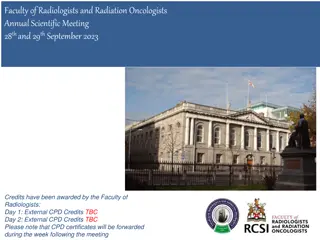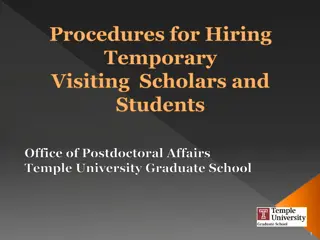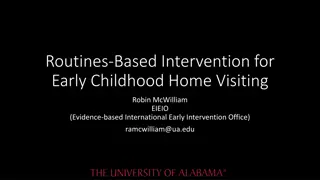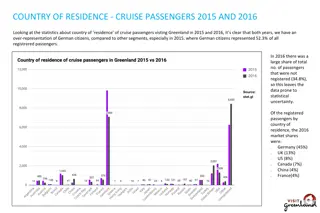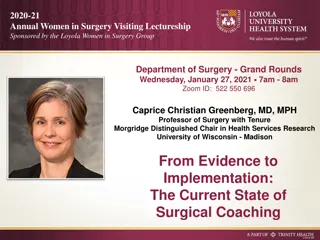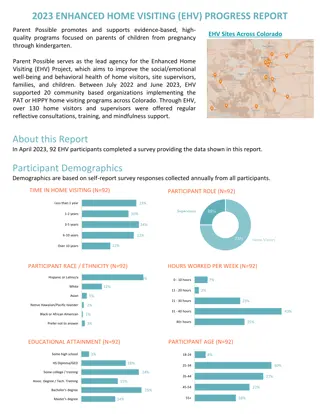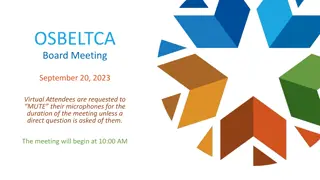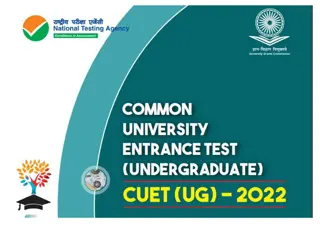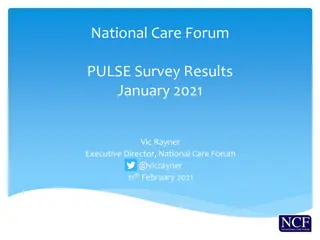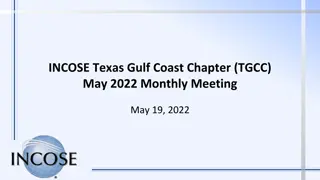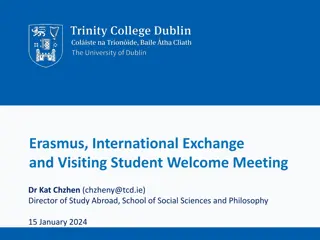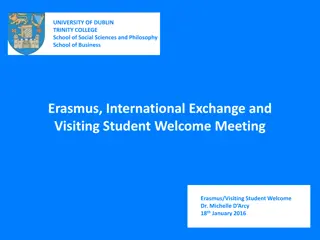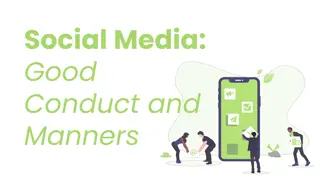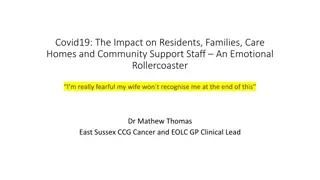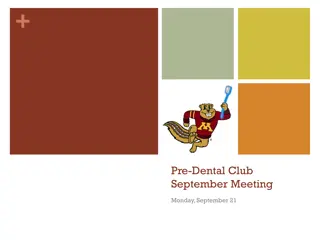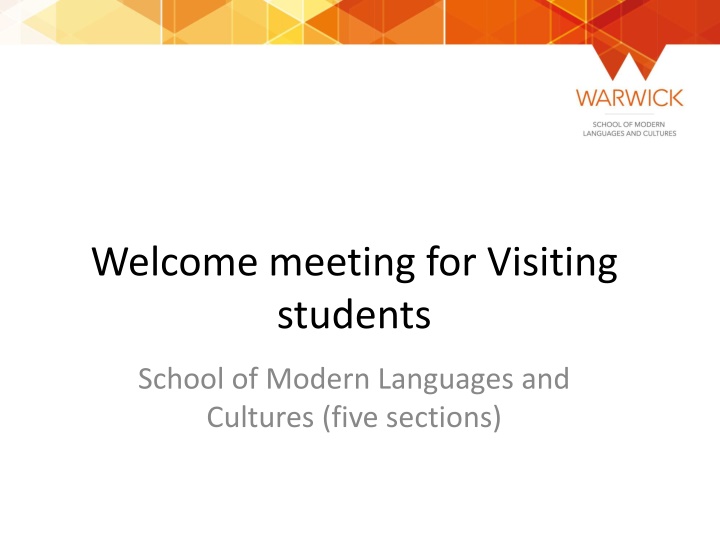
Essential Information for Visiting Students at School of Modern Languages and Cultures
Discover key details for visiting students at the School of Modern Languages and Cultures, including roles of academic staff, academic calendar, monitoring points, and contact requirements. Get insights on personal tutors, academic life, and attendance expectations.
Download Presentation

Please find below an Image/Link to download the presentation.
The content on the website is provided AS IS for your information and personal use only. It may not be sold, licensed, or shared on other websites without obtaining consent from the author. If you encounter any issues during the download, it is possible that the publisher has removed the file from their server.
You are allowed to download the files provided on this website for personal or commercial use, subject to the condition that they are used lawfully. All files are the property of their respective owners.
The content on the website is provided AS IS for your information and personal use only. It may not be sold, licensed, or shared on other websites without obtaining consent from the author.
E N D
Presentation Transcript
Welcome meeting for Visiting students School of Modern Languages and Cultures (five sections)
Who is who in the School? Dr Philippe Le Goff Director of Incoming Visiting Students Contact SMLC staff via email. See here for a list of academic staff
Your Personal Tutor The role of the Personal Tutor is pastoral and academic Personal tutors and all academics have dedicated advice and feedback hours check their webpages for details They are your first point of contact for any pastoral issues
Academic life The Warwick academic year is divided into three terms of 10 weeks each; the term times are approximately; Autumn: October to December, Spring: January to March, Summer: April to June. Term dates are available on this webpage Teaching: lectures and seminars are mainly held in the Autumn and Spring Terms. The Summer Term is mainly reserved for revision and examinations, although there are some subject areas which continue teaching modules.
Monitoring Points Attendance at teaching events is compulsory for students If you cannot attend a teaching event you MUST email the tutor involved In the School of Modern Languages and Cultures, we are obliged to monitor students attendance
Monitoring Points Term 1 Contact with department s Incoming Visiting Students Co-ordinator or Personal Tutor by the end of Week 1 Submission of Learning Agreement to School Office by end Week 3 Attendance at a face-to-face or live online synchronous teaching event in Week 5 Attendance at a face-to-face or live online synchronous teaching event in Week 7 Attendance at a face-to-face or live online synchronous teaching event in Week 9 Attendance at a face-to-face or live online synchronous teaching event in Week 10 Term 2 Attendance at a face-to-face or live online synchronous teaching event in Week 1 Attendance at a face-to-face teaching event in Week 4 Attendance at a a face-to-face or live online synchronous teaching event in Week 8 Attendance at a a face-to-face or live online synchronous teaching event in Week 10 Term 3 Completion of agreed summative assessment tasks *note that not all visiting students stay for the whole academic year; only those Monitoring Points which cover the duration of the visit apply.
Learning Agreements The Erasmus Plus Learning Agreements are provisional (for funding); You should finalise the Erasmus Plus Learning Agreement once you have a place on your modules The confirmed Learning Agreements should show an accurate list of Warwick modules taken
Module selection For SMLC-based modules, please complete the module preference form as soon as possible. See here for the list of available module in the School of Modern Languages and Cultures For History, English, CAL (Centre for Applied Linguistics) and other departments: you will need to contact the relevant departments. English normally only possible from week 2. Most teaching begins next week, i.e. w/c Monday 3 October Philippe Le Goff can provide academic support for choosing modules. You can also contact module leaders to ask about module content, level, assessment etc.
Please note: subject departments at Warwick may not correspond to subject areas in the home University You should always check with your host institution to ensure the modules you have chosen are suitable
Language Centre modules Webpage for Language Centre academic modules How to enrol for Language Centre modules If you take an academic module for CATS, i.e. as part of your academic studies, enrolment opened at 12pm Friday 23 September. The deadline to complete pre-enrolment is 4pm Monday 17 October. See here for information on language courses (called Lifelong Language Learning) that are not for CATS, i.e. an extra- curricular activity.
Part-year student assessment Special Assessment methods are available for students who leave Warwick prior to the Summer Term or who do not complete a full academic year. Special Assessment methods can consist of written exams, the submission of individual essays, or other types of tests, where appropriate. Please speak to smlcoffice@warwick.ac.uk
Credits (CATS) Credit is given in CATS: one ECTS is equivalent to two Warwick CATS Full Year 100% of the total CATS credits workload = 120 CATS Full modules (full academic year) are normally 30 CATS (15 ECTS); Half modules (one term) are counted as 15 CATS (7.5 ECTS); Part-year students: the weighting used for a year-long module is normally 40% for Autumn Term, 40% for Spring Term and 20% for Summer term The above information about module selection is available for you to consult on the Visiting Students webpage
Study Skills Training To help you understand teaching and assessment methods in SMLC and at Warwick Study Skills: lecture programmes (asynchronous recordings) introductory information advice lecture slides Visiting Students should follow the first-year Study Skills course; there is a separate section for Visiting Students on Moodle with an introductory video on it
Language Support English language tuition is offered by Warwick Foundation Studies Full information can be found on this webpage If you have any questions email insessional@warwick.ac.uk Places are booked on courses on a 1st come 1st served basis. These courses are not for credit , however informal recognition of this can be obtained. Home institutions may then decide whether sessions can be credited in their system.
IT @ Warwick Tabula timetable, registration status, personal tutor information Moodle teaching and learning resources, assessed work submission and feedback Software available on managed computers and personal computers Central University Resources remote access drive, help, advice and training
E-mail Webmail http://go.warwick.ac.uk/mymail Synchronize to Phone / Tablet / Laptop / PC Follow instructions for software / app using settings below: Type of Account: Exchange E-mail address: IT services usercode followed by @live.warwick.ac.uk e.g. u1234567@live.warwick.ac.uk Username: Same as e-mail address Password: IT services account password
IT Help http://www2.warwick.ac.uk/services/its/servicessupport/
H: Drive Access your files everywhere! On managed desktops (e.g. library) Computer H: Drive Own computer Use WebDAV: https://www2.warwick.ac.uk/services/its/servicessupport/datast orage/myfiles/myfiles-webdav Web Browser myfiles.warwick.ac.uk http://www2.warwick.ac.uk/services/its/servicessupport/dat astorage/myfiles/
Further support and information In the first instance, contact your personal tutor Student Support Services at Warwick include the Counselling Service Nightline 24hrs confidential support for students
Financial queries Your home university s International Office or Exchange Office can provide support for home university bureaucracy Financial, Visa and Erasmus Plus queries at Warwick contact Study Abroad team at Warwick: studyabroad@warwick.ac.uk
Meeting new students The Students Union has over 250 student- run societies. Part of the British university experience. A good way to meet people. Language societies: French society German society Hispanic society Italian society
SSLC - What it s about What it can do for you Role of the SSLC rep How to take part
What its about SSLC = student staff liaison committee Dialogue between students and staff A way for students to have their say on their educational experience at Warwick
What it can do for you If you have a student representing you on the SSLC, you can raise an issue with your rep who will discuss it at the meeting and then report back Issues discussed: teaching, assessment, resources, student support, careers development
Role of the SSLC rep Collect views from the student group you represent and discuss these at SSLC meetings Attend the online SSLC meetings (around 5 a year) Report back decisions taken at the SSLC meetings Advantages for the rep: bring about change, get to know fellow students and work with staff, something interesting on the CV
How to take part Interested in becoming a rep and representing all the incoming Erasmus students? Contact Margaux Whiskin m.whiskin@warwick.ac .uk by Friday 14 October, 5pm (week 2)
Find your Language Buddy
What its about Interested in meeting other students in the School of Modern Languages and Cultures? Do you want an opportunity to practise your English outside of the classroom? Would you be happy, in exchange, to give a student the opportunity to practise French/Spanish/Italian/German?
How it works Send an email to Margaux Whiskin by Friday 14 October, 5pm (m.whiskin@warwick.ac.uk) We will pair you up with a student and help organise your first meeting
What next? Any academic questions can be directed to Philippe Le Goff Any administrative questions can be directed to the SMLC office: smlcoffice@warwick.ac.uk Visiting students webpage: https://warwick.ac.uk/fac/arts/modernlanguages/int ranet/undergraduate/visitingstudents/



